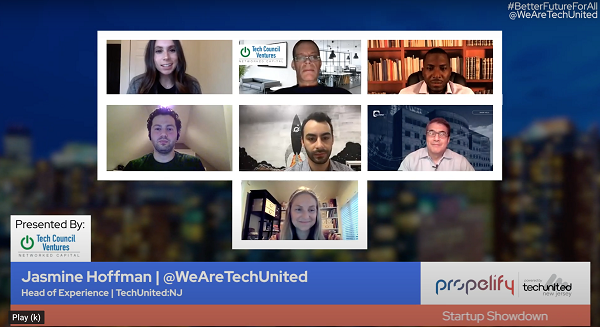Three NJ Startups Pitch to Investors at Propelify Startup Showdown
TechUnited:NJ (New Brunswick) and Tech Council Ventures (Summit) presented another Startup Showdown pitch event, this one on the last day of Propelify.
Moderated by Jasmine Hoffman, head of experience at TechUnited:NJ, this event featured three startups with New Jersey connections: CatapultX (Montclair), Beyond Main (Summit) and Hudson Space Systems (Hoboken).
Presenting feedback and asking questions were Jim Gunton, founder and managing partner of Tech Council Ventures; Roger Soares, founder and managing partner of Ellavation Capital Advisors; and Rene Veloso, client development executive at the international law firm DLA Piper (Short Hills).
Zack Rosenberg, CatapultX
First to pitch was Zack Rosenberg, cofounder and CEO of CatapultX, an ad-tech startup.
Audiences hate interruptive advertising, he told the judges. “How often do you go to a website, see a video that you want to watch and are stopped by an ad? … Each and every time. And it probably drives you nuts. If you can see the advertising, it’s not working.”
He said that the advertising industry has known about this for years. About 85 percent of viewers will leave a video “as soon as they see these ads start, and 65 percent are going to hit skip as soon as they can.”
CatapultX is partnering with some of the world’s largest video creators to solve this very problem, creating a $350 billion-a-year opportunity.
Another question the company is asking is why video content creators have to choose between making money and serving the interests of their most valuable asset: their audiences.
The startup has devised a way to increase a video content creator’s revenue by about 80 percent, he said, using a format that’s “preferred by audiences nine to one over these interruptive ads.”
Rosenberg noted that the company’s artificial intelligence (AI) software scans and analyzes every frame of a video to understand its context, “what’s happening, who is in it, where they are, what music is playing.” They look for any information they can gain about the video, in order to repackage it and provide it to advertisers.
“We also have … at the bottom and around the video created new uninterrupted formats that audiences prefer.” These are “unskippable, they are unmissable, they are part of the content and provide contextual relevancy and better response rates from the audience.”
In response to a question from Gunton, Rosenberg said that what sets CatapultX apart from other ad-tech companies out there is the relevancy of its product. “We truly understand every single frame and every element of what’s in the video. What others in the space will do to understand contextual relationships between the video and the advertiser is they will look through the transcripts, what’s said in the video. Based on our internal analysis, that only gives you 10 percent of what the video is about. By using all of our algorithms, up to 20 on a single video, we truly understand the full breadth for the relevancy and the moments that make sense for that advertisement.”
Kate Giovambattista, Beyond Main
Beyond Main is the “shop-local-but-online marketplace,” said founder and CEO Kate Giovambattista. “What Beyond Main is doing is reimagining how we shop local and interact with our communities, and what that impact actually quantifies and looks like.” Online buying has impacted how we interact and behave, she added. And this shift has affected business communities, causing them to be challenged financially in ways they have never experienced. Small business is struggling to keep up with the rapid consumer change and the tech advancements around it, she said.
“Online marketplaces have now emerged as the second-preferred shopping channel next to retail stores.” Two-thirds of small businesses are not e-commerce enabled, said Giovambattista. A lot of small businesses will fail due to the shift to online e-commerce during the pandemic, she added.
The good news is that we have a choice as consumers, she said, and Beyond Main is attempting to redirect consumers’ online spending to local businesses in a simple and convenient way. Giovambattista has a deep domain knowledge about Main Streets’ struggles, she noted.
Beyond Main invites users to take a “scroll down Main Street” on their phones. Businesses can get online easily through a content-management system that requires no coding. “They can set up an e-commerce site within less than 24 hours. … We are a commission-free marketplace, which makes us unique,” she said. Shoppers get an aggregated cart, which serves as a one-stop shop for all their purchases.
Answering a question from Soares, Giovambattista noted that this startup is very young, and is looking for pre-seed funding. They have several customers, and expect to double their reach during this year. “We are currently taking our pilot program that we hosted in Summit, and we partnered with three other towns here in New Jersey, and we are in conversation with a few others.”
In response to a question from Gunton, she said that there is a consumer movement with buyers focused on where their goods are coming from. Consumers want to know they are buying from trusted sources. They also want to know where they are spending their money and what impact it is having.
Nathan Tahbaz, Hudson Space Systems
Hudson Space Systems is a startup that offers companies a way to perform experiments in microgravity to “fast-forward innovation,” for a less expensive price than is currently available, cofounder and CEO Nathan Tahbaz told the Propelify audience. The startup aims to help pharmaceutical companies, physics researchers and materials science researchers at companies and universities conduct research in space.
Companies aren’t doing more research in space because current options start at $15,000 per kilogram (kg) for any weight added to the rocket’s payload, and access is limited. The startup wants to change this. “Our microgravity as a service model will encourage a broad spectrum of customers to take advantage of research in microgravity,” he said.
“We want to make this as easy as booking your reservation online. Send us your payload, pick a launch date, prep your experiment, launch, learn and repeat.” Tahbaz believes that there is a $1.5 billion total addressable market for this service.
Hudson has designed a rocket with an 80-kg payload capacity, and it plans to offer the service at $9,500 per kg, with up to 80 customers per launch. The secret is the rocket design, which will let the company charge less and offer three minutes of microgravity time to its customers, Tahbaz said. The 3D-printed engine is quick to manufacture, and is reusable for up to 15 launches.
The company has already raised money, including $500,000 that came in for the design project before the company was founded, and some angel money. They are looking to close a $1.5 million round, which includes $100,000 raised in March, $50,000 already committed towards reservations, and a commitment from a family office, assuming that the company can interest another investor.
In response to a question from Veloso, Tahbaz noted that each individual customer would be able to determine how much of the payload they needed. He added that Hudson anticipates an expanded market because, with their less-expensive service, they will be able to reach a “whole bunch of customers that currently don’t see the value” in doing this kind of research.




